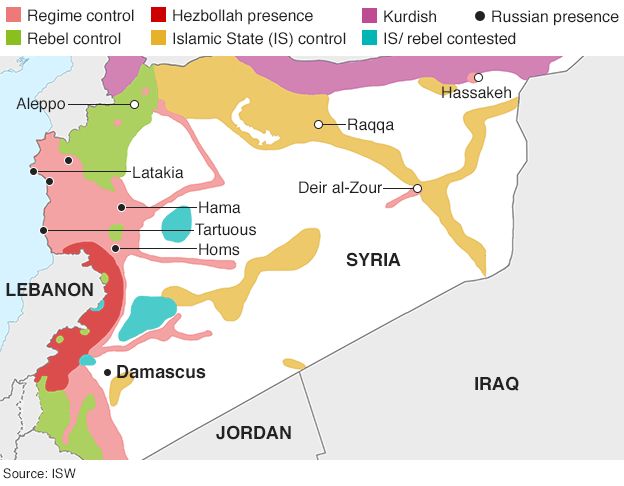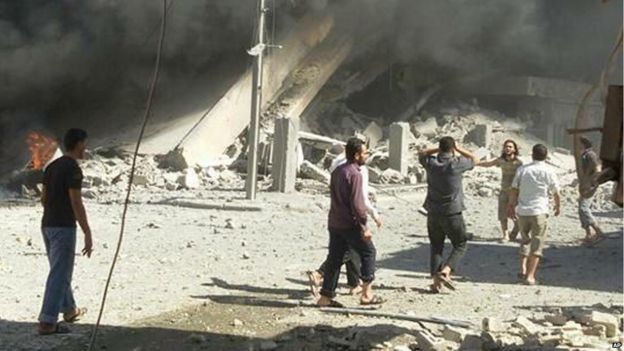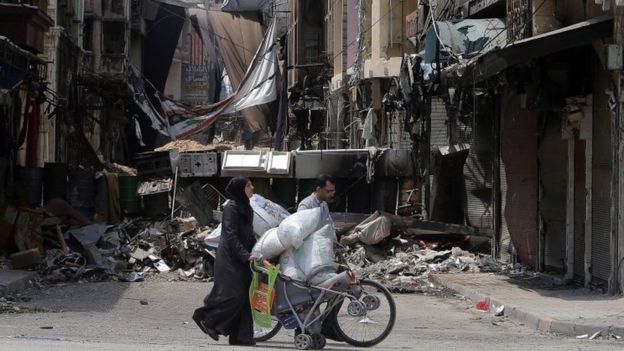Syria conflict: Russia launches fresh strikes
- 25 minutes ago
Russia has launched air strikes in Syria for a second day, saying that Islamic State (IS) had been targeted.
The defence ministry said its jets had destroyed an IS ammunition depot and control centres.
However, the areas reportedly attacked appeared to be held by groups opposed to IS and the Syrian government.
The US and its allies fear the strikes have been targeting non-IS opponents of Russia's ally, Syrian President Bashar al-Assad - a claim denied by Moscow.
Meanwhile, the Pentagon and Russian military officials are due to hold talks on avoiding clashes between their forces in Syria.
The latest attacks reportedly hit sites in the north-west held by the Army of Conquest rebel alliance, as well as areas in Homs and Hama provinces.
The strategic town of Jisr al-Shughour was hit, as well as areas in Idlib province and Hama province further south, according to Lebanon's al-Mayadeen TV.
Rebel activists also reported strikes at Ghantu in Homs province, close to some of Wednesday's attacks.
Russia said it had hit 12 IS positions in the past 24 hours, although this cannot be independently verified.
Analysis by Jonathan Marcus, BBC diplomatic correspondent
The Syrian government's army may not be what it was, but in local terms it is still a force to be reckoned with.
Bolstered with new Russian equipment and now backed by Russian air power, it could hold its own against most of the opposition forces.
Russia does not have the elaborate intelligence gathering panoply of the US. But much of its targeting will be based upon tactical intelligence obtained from Syrian units on the ground.
This then is the key to Russia's strategy. It is to consolidate the Assad regime, to relieve the pressure points and to ensure that its ally remains a factor in any future diplomatic settlement.
To this end - and there are strong indications of this even from Russia's initial air strikes - Moscow will hit any opponents of the Syrian regime where necessary.
Two of Thursday's sorties were against a rebel group trained by the CIA, its commander said.
Hassan Haj Ali, of the Liwa Suqour al-Jabal group, told Reuters news agency that about 20 missiles had hit their training camp in Idlib province.
He said the Russian jets were identified by former Syrian air force pilots who are now members of his group.
The Army of Conquest (Jaysh al-Fatah) alliance had made advances in the north-west in recent months, taking Idlib and Jisr al-Shughour from pro-government forces.
The alliance includes the al-Nusra Front, al-Qaeda's affiliate in Syria, and the hard-line Islamist group Ahrar al-Sham, as well as several more moderate Islamist groups.
All are opposed to IS and have fought bloody battles with the jihadist group.

More than 50 planes and helicopters are involved in the Russian military operation in Syria, Russia's defence ministry said.
Opposition groups said Wednesday's attacks had killed more than 30 civilians. However, President Vladimir Putin denied the claims, telling Russian television that the first reports of civilian casualties came "even before our jets took off".
The US, which is targeting IS with air strikes in both Syria and Iraq, says it was informed about Russia's air strikes only an hour before they began on Wednesday.
The French defence minister said the strikes had not targeted IS, while US Defence Secretary Ashton Carter said Russia's approach was "tantamount to pouring gasoline on the fire".
 AP
APBut Russian Foreign Minister Sergei Lavrov said his government stood by its targets.
"The rumours that the target of these air strikes was not IS positions are unfounded," he said.
Mr Lavrov said there was a need to "establish channels of communication to avoid any unintended incidents". His US counterpart, John Kerry, said talks would be held "as soon as possible," maybe as early as Thursday.
Syria's civil war
 AFP
AFPWhat's the human cost?
More than 250,000 Syrians have been killed and a million injured in four-and-a-half years of armed conflict, which began with anti-government protests before escalating into a full-scale civil war.
And the survivors?
More than 11 million others have been forced from their homes, four million of them abroad, as forces loyal to President Assad and those opposed to his rule battle each other - as well as jihadist militants from IS and other groups. Growing numbers of refugees are going to Europe.
How has the world reacted?
Regional and world powers have also been drawn into the conflict. Iran and Russia, along with Lebanon's Hezbollah movement, are propping up the Alawite-led government. Turkey, Saudi Arabia and Qatar are backing the Sunni-dominated opposition, along with the US, UK and France.
Are you in the area? Have you been affected by this story? Let us know about your experiences. Email haveyoursay@bbc.co.uk with your stories.
Please include a contact number if you are willing to speak to a BBC journalist. You can also contact us in the following ways:
- WhatsApp: +44 7525 900971
- Send pictures/video to yourpics@bbc.co.uk
- Upload your pictures / video here
- Tweet: @BBC_HaveYourSay
- Send an SMS or MMS to 61124 or +44 7624 800 100
Or please use the form below: